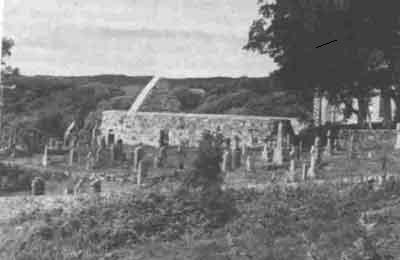SONG FOR THE PRINCE
Chorus:
O, hi ri ri, he is coming.
O, hi ri ri, our exiled King,
Let us take our arms and clothing.
And the flowing tartan plaid.
1. Joyful I am, he is coming
Son of our rightful exiled King,
A mighty form which becomes armour,
The broadsword and the bossy shield.
2. He is coming o'er the Ocean
Of stature tall, and fairest face,
A happy rider of the war-horse,
Moving lightly in the charge.
3. Like the gales of March his visage
Or dog-tooth in the wind storm is seen;
A slim sword in his hand for battle
To cut down foes like standing grain.
4. The music of thy pipes and banner,
Would fill thy folk with reckless fire,
Our proud spirits would awaken,
And we'd put the mob to rout.
5. The thundering of bombs and cannon
With its force will rend the earth,
Hill and dale will answer to it,
And the echo leave us deaf!
6. Pity him who on that day then
Wears the ugly coat of red,
His black hat, bordered and cockaded,
Split like a cabbage round his ears!
Translated by John Lorne Campbell (Highland Songs of the '45)
|
Luinneag:
O, hì-rì-rì, tha e tighinn,
O, hì-rì-rì, 'n Rìgh tha uainn,
Gheibheamaid ar n-airm 's ar n-éideadh,
'S breacan-an-fhéilidh an cuaich.
1. 'S éibhinn liom fhìn, tha e tighinn,
Mac an Rìgh dhlighich tha uainn,
Slios mór rìoghail d'an tig armachd,
Claidheamh us targaid nan dual.
2. 'S ann a' tighinn thar an t-sàile
Tha 'm fear àrd as àille snuadh,
Marcaich' sunndach nan steud-each
Rachadh gu h-eutrom 'san ruaig.
3. Samhuil an Fhaoillich a choltas,
Fuaradh froise 's fadadh-cruaidh;
Lann thana 'na làimh gu cosgairt
Sgoltadh chorp mar choirc' air cluain.
4. Torman do phìoba 's do bhrataich
Chuireadh spiorad bras 'san t-sluagh,
Dh'éireadh ar n-ardan 's ar n-aigne,
'S chuirte air a' phrasgan ruaig.
5. Tairneanach a' bhomb 's a' chanain
Sgoilteadh e 'n talamh le 'chruas,
Fhreagradh dhà gach beinn 's gach bealach,
'S bhodhradh a mhac-tall' ar cluas!
6. Gur mairg d'an éideadh 'san là sin
Còta grànnd' de 'n mhàdur ruadh,
Ad bhileach dhubh us cocàrd innt'
Sgoiltear i mar chàl mu'n cluais!
|
CHANT POUR LE PRINCE
Refrain:
Fini l'exil! Avec audace,
Le roi banni vient d'arriver.
Revêtez armes, cuirasses
Vos filabegs, vos amples plaids!
1. Je contemple enfin la stature
Du fils exilé du vrai Roi!
Il vient équipé de l'armure,
De la large épée, du harnois.
2. Voyez sa taille et sa prestance!
Puisse ce cavalier puissant
Mener la charge avec aisance,
Lui qui traversa l'océan.
3. Son visage évoque tempêtes
Crocs du blizzard, violents embruns.
A faucher l'ennemi, s'apprête
La lame qu'il tient à la main
4. Sa cornemuse et sa bannière
Instillent en nos sens le feu,
Réveillant nos vertus guerrières
Pour que nous dispersions ces gueux.
5. Que le canon et la mitraille
Ebranlent le sol puissamment
Et que monts et vallées tressaillent
De ces échos assourdissants!
6. Plaignez le malheureux qui porte
La rouge livrée de l'Anglais:
Tricornes noirs, rubans, cocardes,
Comme des choux seront tranchés! (*)
(*)texte anglais: "comme un chou fendu sur ses oreilles".
(Trad. Ch.Souchon(c)2006)
|

